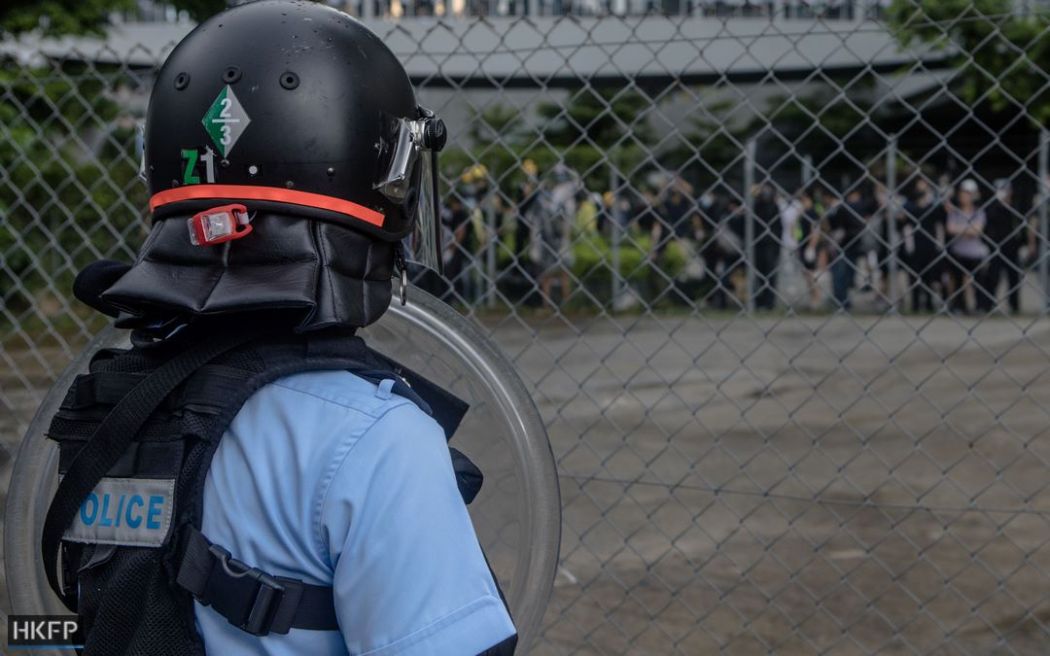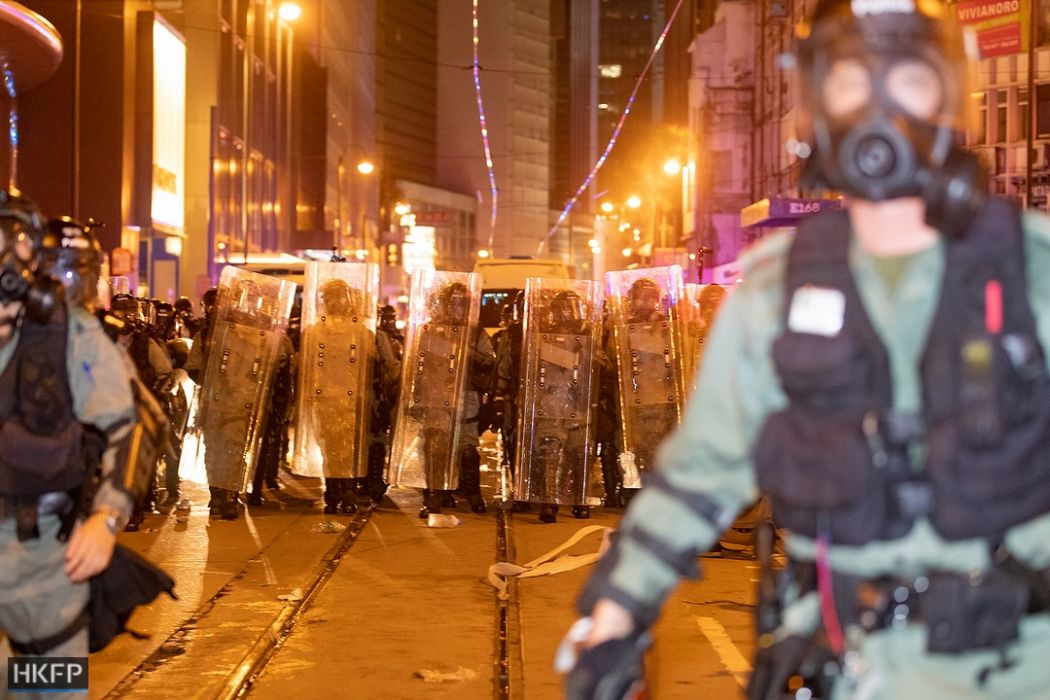
On the evening of June 21, Patrick Lee wanted to talk about love. Hundreds of protesters had surrounded Wan Chai police headquarters, vandalising its facade and chanting “shame on corrupt cops.”
Lee’s mission was to get protesters to lift the blockade. Stepping outside the building, he made a plea in front of the television cameras: “I’m a police officer but I’m also a Hongkonger… Inside there are many colleagues with different needs, including a pregnant woman. The medics have arrived but can’t get in. Do you think that our colleagues are not people?”

“Hong Kong needs love, not swearwords or posturing. That is all I have to say.”
It was the early days of Hong Kong’s 2019 protests, before the police became engulfed in worsening scandals over alleged brutality and collusion. With his impassioned speech, Lee – a chief superintendent and the deputy director of the Hong Kong Police College – might have stood a chance of winning protesters over. But as he started to walk away, he gave them the middle finger.
Lee could not have known it at the time, but that gesture was the last straw for a young police recruit who was training at the academy he runs.

Paul – a university student in his early 20s – had wanted to be a cop for as long as he could remember. But at the end of June, he decided to quit. Speaking to HKFP on condition of anonymity, he recalled how he became disillusioned with his dream job after witnessing a culture of impunity.
“The police had become very different from what I thought it would be. I didn’t want to serve any more, so I handed in my resignation letter to my class instructor,” he said. “The next day, I went to protest.”
Since he was a child, Paul had wanted to follow in the footsteps of his grandfather and other relatives who worked in law enforcement: “I was quite stubborn… I prioritised the force over any other career path, though my parents were not very enthusiastic.”

The reputation of Hong Kong police took a hit during the 2014 Umbrella Movement, when Paul was in high school, but at the time he was still a resolute “blue ribbon” – a government supporter in favour of tough policing.
In May, he was accepted into the Auxiliary Undergraduate Scheme (AUS), a programme that targets university students. Recruits complete 12 weeks of basic training and become Auxiliary Police Constables, joining the ranks of some 3,000 people who would serve as backup manpower for the 30,000-strong police force.
Paul started his basic training just days before a million Hongkongers took to the streets to oppose an extradition bill that would allow for fugitive transfers to mainland China. A week later, the turnout would increase to two million, organisers estimated, sparked by the lack of concessions from Chief Executive Carrie Lam.

That period also marked the beginning of a cycle of violence that would continue for months. On June 12, police started to use tear gas, rubber bullets and bean bags to disperse protesters occupying roads, while protesters threw objects at police lines.
“I started to have doubts after watching the news… I will never forget that scene: Raptors charged at a student who had surrendered, and hit him with batons while he lay on the ground,” Paul said, referring to officers from the Special Tactical Squad.
“That was inconsistent with the use of force guidelines that I was learning in Police College.”
The Force Procedures Manual dictates that “only the minimum force necessary to achieve the purpose may be used and once that purpose has been achieved, the use of force shall cease.” Officers should also “exercise a high degree of restraint when dealing with the public,” and “shall not resort to the use of force unless such action is strictly necessary and he is otherwise unable to effect his lawful purpose.”

As June went on, Paul said he became more conflicted as the violence escalated; some of his university friends complained to him about being tear-gassed while protesting peacefully.
Paul said that the police were being used as a “political tool” by the Hong Kong government, but hastened to add he was not defending officers’ behaviour. “The government put the police in a difficult situation, but it is also absolutely correct to say that officers violated the Police General Orders,” he said, referring to the mandatory rules that police must comply with.
“The situation is a real pity, but they don’t deserve sympathy. They are in the wrong. They don’t deserve forgiveness.”
Switching sides
Most of Paul’s classmates have completed their training and begun active duty. The cohort started with more than 80 people, Paul said, but by the time of the Passing Out Parade, there were only about 70 left.

As for his decision to quit, Paul said he was lucky that it didn’t cause any major backlash. “I think 95 per cent of the people around me were happy for me. The rest probably think I’m a traitor or a cockroach,” he said, adding that a pro-Beijing acquaintance once tried to doxx him on social media.
Perhaps most surprising was the reaction from his class instructor, who Paul said was sympathetic towards the pro-democracy movement.
“He said, ‘young man, just do whatever you think is right; we won’t stop you.’ That moment I was on the verge of tears. I truly respect him a great deal,” Paul said.
Citing his class instructor as an example, Paul argued that it was still possible for dissenting voices to exist within the police – though the pressure to conform is great. That change was visible in his former classmates’ WhatsApp chat groups and Instagram stories, he said.

“A few months ago, they would write ‘both sides are tired’ and ‘it was the government’s fault.’ Now, they would be more combative and say that ‘peaceful protest is a lie’ and ‘everyone wants to come after us,’” Paul said.
He said he tried to persuade one or two of his closest classmates to resign, but to no avail. One replied that he was under family pressure to stay in the force.
Now that his police career appeared to be over, Paul said he was continuing his studies and exploring opportunities in business. He has continued to join protests, though he was afraid that his identity could offend both sides: protesters might regard him with distrust, while in the event of an arrest, police may treat him as a traitor.

Nevertheless, he felt compelled to support the demands of the movement, especially calling for an independent commission of inquiry into the police force.
“The first thing they teach in Police College is solidarity, and that when there is a problem everyone bears the consequences together,” he said. “Their actions [against the protest movement] need to be a collective responsibility.”
Hong Kong Free Press relies on direct reader support. Help safeguard independent journalism and press freedom as we invest more in freelancers, overtime, safety gear & insurance during this summer’s protests. 10 ways to support us.

